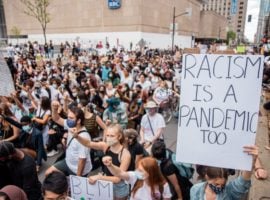“And my husband is six feet under, and I’m looking for a way to feed my kids now.” — Esaw Garner, widow of Eric Garner
“Tangled Roots and Bitter Fruit: What Ferguson can teach the food movement,” by Eric Holt-Giménez, the Executive Director of Food First, a partner of WhyHunger, touches on the perpetuation of racism in our society at large and within the food movement. Holt-Giménez makes the argument that the two go hand-in-hand: “We can’t have a just judicial system, or an impartial law enforcement system, or build a sustainable food system on the foundation of an oppressive social and economic system.”

It is important to educate ourselves about police brutality in our own communities, and to engage in conversation with our colleagues, neighbors and families about how to dismantle the systems that sustain it. While the connection between food justice and racism is not often readily made, it is incumbent upon us as anti-hunger movement builders to learn about the structural oppression inherent in our food system. As Holt-Giménez argues, we cannot shy away from the painful but critical truth that if we do not dismantle oppression, we will we never dismantle hunger.
WhyHunger also recommends reading and studying the Center for Social Inclusion’s Building the Case for Racial Equity in the Food System, a publication that puts a racial lens on our food system, “to diagnose what is wrong with our current system, assess entry points for change, and determine ways that we can work together to build a better [food] system for all of us.”





